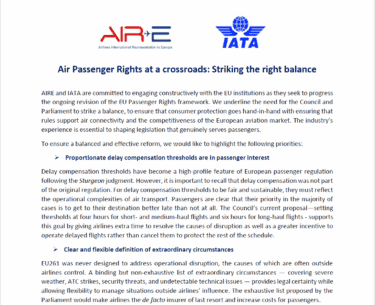On 16 October, the Court of Justice of the European Union (CJEU) delivered a judgment in Case C‑399/24, AirHelp Germany GmbH v Austrian Airlines AG, clarifying the interpretation of the term “extraordinary circumstances” under Article 5(3) of Regulation (EC) No 261/2004 on air passenger rights.
This preliminary ruling was issued in response to a request from the Landesgericht Korneuburg (Regional Court of Korneuburg, Austria), which sought guidance on whether a lightning strike to an aircraft, followed by mandatory safety inspections that delayed its return to service, could exempt the airline from its obligation to compensate passengers for a long delay.
The CJEU held that such an event may constitute an “extraordinary circumstance” under the Regulation, provided the airline can demonstrate that it took all reasonable measures to avoid the delay. This decision contributes to the evolving body of case law interpreting the limits of carrier liability for flight disruptions under EU law.
- Background
Facts
- The aircraft of Austrian Airlines was struck by lightning during a flight preceding the one in question; as a consequence, it underwent mandatory safety inspections by certified technicians, which delayed its return to operation — in this case about five hours after the scheduled departure of the subsequent flight.
- As a result, the passenger’s flight was significantly delayed (more than seven hours) and a claim for compensation was initiated (via AirHelp Germany) against Austrian Airlines.
- Under Regulation 261/2004, Article 5(3) provides that an operating air carrier need not pay the standard compensation (Article 7) for cancellations or long delays if it can show that the event was due to “extraordinary circumstances which could not have been avoided even if all reasonable measures had been taken”
Legal issue
- The Regulation aims to protect air passengers by setting a high level of rights for compensation in many cases of cancellations or delays. The exception for “extraordinary circumstances” must therefore be interpreted strictly.
- The case law of the CJEU holds that for an event to qualify as “extraordinary circumstances”:
- It must not be inherent in the normal exercise of the air carrier’s activity (by nature or origin).
- It must be outside the actual control of the carrier.
- The preamble (Recital 14) to the Regulation explicitly lists certain kinds of weather conditions incompatible with operation of the flight as examples of such extraordinary circumstances.
- General Court´s judgment
The Court’s ruling sets out key findings as follows:
- Lightning strike as ´´extraordinary circumstances´´
- The Court held that the lightning strike on the aircraft which triggered mandatory safety inspections can be classified as an “extraordinary circumstance” under Article 5(3) of Regulation 261/2004, provided those inspections caused the delay or cancellation of the subsequent flight.
- On the first condition (not inherent in normal activity): Although the atmosphere is part of aviation operations and aircraft are designed to resist lightning, the Court concluded that the event (lightning plus mandatory inspections) is not inherent in the normal exercise of the carrier’s business simply because it involves lightning. It therefore may satisfy the first condition.
- On the second condition (outside control): The lightning event and the subsequent inspection derived from a natural cause and are outside the effective control of the air carrier. The Court found that the event meets that criterion.
- The Court further pointed out that because passenger safety is a fundamental objective of the Regulation, classifying such a lightning event as “extraordinary” prevents airlines from being incentivised to prioritise punctuality over safety.
- Reasonable measures requirement
- The Court emphasised that even if the event is qualified as an extraordinary circumstance, the carrier will still need to demonstrate that it took all reasonable measures to avoid the circumstances and/or their consequences (i.e., the delay) in order to be exempt from liability under Article 5(3).
- What counts as “reasonable measures” depends on the technical and administrative capacity of the carrier and what could have been done directly or indirectly without imposing disproportionate burden. The national court must assess this
- Aplication to national court
- The case is remitted to the Austrian court to determine whether Austrian Airlines in the specific circumstances proved that all reasonable measures were taken.
- The ruling clarifies that the lightning strike may free the carrier from the obligation to pay compensation, but it does not automatically do so—the carrier must satisfy the two‑pronged test.
- Key takeaway and legal certainty
- Reasonable measures requirement
- A lightning strike leading to mandatory safety inspections and resulting delay fits the definition of extraordinary circumstances under Regulation 261/2004 if a causal link exists between the event and the delay/cancellation.
- This decision adds to the jurisprudence on what events qualify as extraordinary circumstances (previously e.g. bird strikes) and offers clearer guidance to airlines and passengers.
- Conclusion
The CJEU has held that under Regulation 261/2004, a lightning strike on an aircraft followed by mandatory safety inspections which delay the flight can qualify as an “extraordinary circumstance” that may relieve the carrier of the obligation to pay compensation under Article 7 — provided that the carrier proves it took all reasonable measures. The national court must assess whether the specific steps taken by the carrier met that standard.


